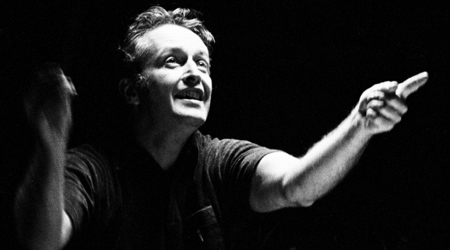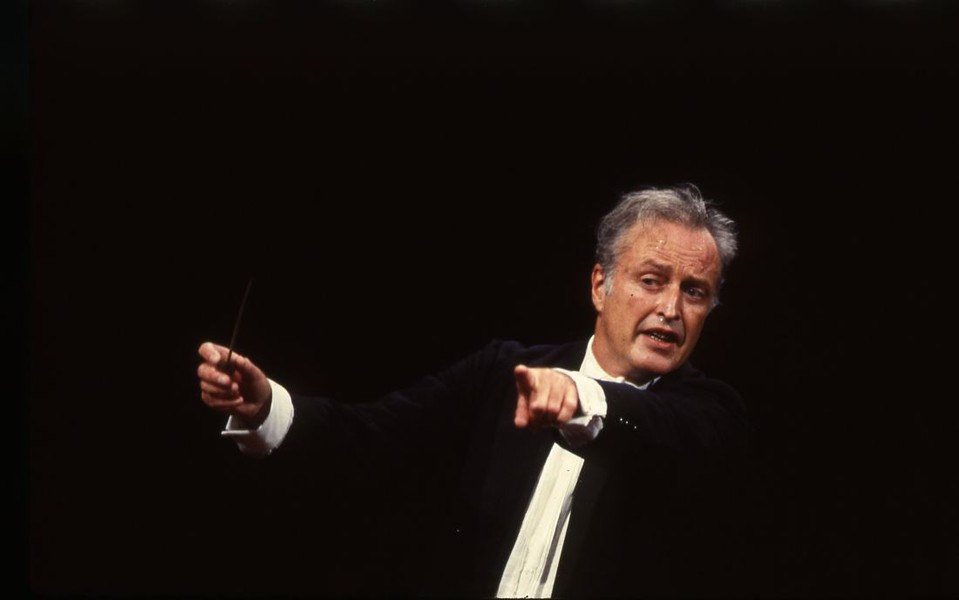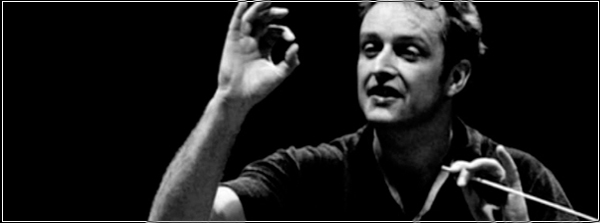Carlos Kleiber
Carlos Kleiber ( born July 3, 1930 in Berlin, † 13 July 2004 in Litija, Slovenia; actually Karl Ludwig Kleiber Bonifacius; too early pseudonyms, such as " Charles Keller" ) was a conductor Austro- American descent. Kleiber was initially and as the 1980s, Austrian ( between Argentine ) citizen. He lived until 1935 and again from 1953 in Germany.
Life
Background and Career
Carlos Kleiber was ( née Goodrich ) was born as the son of Austrian conductor Erich Kleiber and his American wife, Ruth, in Berlin. Ruth Kleiber was the mother of Jewish descent, their ancestors date back to the writer Sir Walter Scott.
Carlos Kleiber grew until 1935 in Berlin, then in Austria, Switzerland, briefly in France and in 1940 in South America. After arriving in Argentina and a temporary stay in Buenos Aires, he attended a boarding school for several years in Chile. Further stations were Cuba, New York and Buenos Aires. His father had Unter den Linden in Berlin not accepted as general music director of the Staatsoper interference by the National Socialist regime in its activities and had emigrated in 1935 from Germany to Argentina. Here was from the German Karl Ludwig, the Spanish "Carlos".
In addition to attending school Kleiber began early to compose and sing, learned the piano and timpani game and made his first formative musical experiences in the wake of his father, whom he accompanied to the samples to the Teatro Colón in Buenos Aires, where Erich Kleiber of until the end Nazi regime was active as a conductor. Rehearsals and performances of his father he also pursued in Chile, Montevideo, Cuba and New York. 1949 Carlos Kleiber began at the behest of his father to study chemistry at the ETH Zurich, broke it in 1950 but to but to study with the support of his father's music in Buenos Aires.
Places artistic activity
In Montevideo Carlos Kleiber conducted by its own account for the first time a small radio orchestra. First practical experiences in an opera house, he gathered in the Teatro de la Plata, near Buenos Aires as an assistant and accompanist. In 1952 he continued his career as a coach at Gaertnerplatz Theatre in Munich. 1955 debuted Kleiber Gasparone in Potsdam under the pseudonym " Charles Keller". After a brief stopover at the Vienna Volksoper 1957-1964 he was conductor at the Deutsche Oper am Rhein, where he conducted from 1960 a rich repertoire by guest appearances at the Salzburg State Theatre and Hamburg.
1964-1966 he was also engaged at the Zurich Opera as conductor. 1966-1972 he was first Kapellmeister at the Staatstheater Stuttgart, where he still occurred sporadically until 1975. 1966, a first foreign guest performance led him to the Staatsoper Stuttgart to the Edinburgh Festival, where he conducted Alban Berg's Wozzeck, the work which his father had premiered in Berlin in 1925.
At the Bavarian State Opera from 1968 to 1973 Nuthatch had a guest engagement, even after he celebrated there until 1988 as a guest triumphs. He also had a few guest appearances at the Vienna State Opera, where he 1974 Tristan und Isolde conducted in 1973 as well as in his first appearance at the Bayreuth Festival. He also in 1974 made his first rostrum of La Scala and the Royal Opera, Covent Garden directed respectively performances of Der Rosenkavalier.
In the U.S., Kleiber conducted according to a 1977 ruptured guest performance at the San Francisco Opera then 1978 ( and again in 1983 ) concerts with the Chicago Symphony Orchestra - it remained his only U.S. concert appearances. In 1988 he was seen at the Metropolitan Opera when he was there in La Bohème Mirella Freni and Luciano Pavarotti with his opera debut. Later he also directed La Traviata, Otello and Der Rosenkavalier here.
From the 1970s he worked with several orchestras always tightly together, especially with the Vienna Philharmonic and the Bavarian State Orchestra, with whom he also toured several times. In 1989 and 1994 he conducted at the initiative of the Federal President Richard von Weizsäcker two benefit concerts with the Berlin Philharmonic, but declined the orchestra from him brought to its offer to become Herbert von Karajan's successor.
Carlos Kleiber occurred with advancing age on increasingly rare, though he was one of the most sought after conductors. After Stuttgart, he accepted no firm commitment more. From the mid- 1990s he withdrew more and more. His last performances were held with the Symphony Orchestra of the Bavarian Radio in early 1999 in Las Palmas, Valencia and Cagliari on a tour of Spain.
Work style
Music connoisseurs include Carlos Kleiber to the most important conductors in the finale of the 20th century. From a survey by the BBC under 100 major conductors today he emerged as the greatest conductor of all time. However, its peculiarities and claims distinguished him from many of his colleagues. Carlos Kleiber was limited with a growing career and age more and more on a relatively small, selected repertoire; He conducted more and more always the same works. Until he got the baton in front of audience, were often several obstacles to overcome: persuasion by the organizers, assurance adequately sized samples to meet the artistic standards, the be able to implement Maestros stage fright and his self-doubt, a work by his ideal. Insofar Karajan goes kolportierter saying, Kleiber was conducting only when " his fridge empty" is to Kleiber's nature and his artistic ambition far over. Discussions about Kleiber's fees and their role obligations, there was, however, repeatedly; about as he prepares for a concert with the Bavarian State Orchestra in Ingolstadt Audi A8 received a salary as 1996.
Carlos Kleiber defied the music industry and the sometimes tending to the superficial interpretation practice is strictly forbidden. He was feeling less about getting to play the notes correctly, but rather a question of translating the composer's intentions authentic and genuine. For this purpose he intensively studied the literature on each of his works listed. The classic " union line " of the orchestra led him not only to intense and demanding samples, it gave the unwillingness of so many musicians, but especially to meticulous preparation of individual orchestral parts, which he decorated with his own entries to bowing, phrasing, dynamics, etc. and which were to be binding.
All concerts Kleiber apply to the audience as memorable, even the photographs exude an incredible liveliness. Rumors, Carlos Kleiber conduct could also led to talk to a sell-out of tickets within a few hours. But that Kleiber spark jumped without long samples showed in his spontaneous takeovers of conducting engagements or at a young age, when the conductor with his wishes could not prevail so strong. Later failed quite a few engagements, because orchestras and opera houses did not meet his conditions. Ultimately, this led in 1982 during the recording of Richard Wagner's Tristan und Isolde in Dresden for the abrupt end of his short studio recording career. The recording went on for months and at the end traveled Kleiber precipitously prior to finishing the recordings from because he had clashed with one of the soloists. That the passage was added later in the studio (which is the issue at all allowed ) led to Kleiber's break with the record company.
Kleiber spoke several languages fluently ( German, Spanish, English, French, Italian and Slovene ), which he (and letters ) also apply eloquently finished in the samples in the respective countries. However, he withdrew all his life largely to the public and gave no interviews. The only known interview, recorded during a concert at the NDR in Hamburg in 1960, was first documented in the Nuthatch Biography of Alexander Werner. Soundbites are obtained almost exclusively through official or unofficial sample recordings. Became famous his now published on DVD TV recordings of rehearsals and performances of Der Freischütz and bat overtures with the Südfunk Symphony Orchestra in 1970, documenting his personal working style vividly.
An unusual characteristic of his musical rehearsals was the fanciful imagination assets, with which he could convey musical moods and graphic content, especially in symphonic works based on extra-musical images. His instructions were often very imaginative, pictures and witty, like the few sample recordings document.
Kleiber's conducting style was unconventional and unusual, as he avoided tend to be vertical strokes within the normal beat patterns in favor of a more linear and oriented to the melodic lead and the musical flow gestural and musical design. Often his shock figures were the actual clock superior ( in hemiolas, transitions, or followed the phrase and not the clock path). Added to this was, if necessary, a high degree of independence of the hands. This gave his conductor's gestures a special liquid and elegance, but if necessary precision could not miss.
Carlos Kleiber conducted always by heart in concerts.
The phenomenon of Kleiber's artistic work is, inter alia, that a highly sensitive, human often sensitive conductor often had to overcome self-doubt and scruple to meet with optimum working conditions the highest imposed on himself claims that existed above all in a musical to have to work in his characterological, psychological subtleties into penetrated and appropriated to convey these musicians and audiences with great authenticity.
Private
Carlos Kleiber was with the Slovenian dancer Stanislava Brezovar ( called Stanka ) married. They had met in the ensemble of the Deutsche Oper am Rhein in Dusseldorf and lived in Grünwald near Munich.
Carlos Kleiber died at the age of 74 years despite illness as a complete surprise in his vacation home in Slovenia. He was on the side of his six months earlier died in December 2003, Ms. where about an hour's drive from Ljubljana village Konjšica ( a district of Litija ) not far from their birthplace Zagorje ob Savi buried. Stanka and Carlos Kleiber left a son ( Marko ) and a daughter ( Lillian ).
Carlos Kleiber maintained friendships with many important artists of his time, and colleagues, among others, the conductor Riccardo Muti and James Levine, the director Franco Zeffirelli and the singers Plácido Domingo and Lucia Popp.
Quotes
" The sudden death of Carlos Kleiber leaves us all speechless. He was a man of genius, who was recognized even among his colleagues as the most important conductors Conductor of the second half of the 20th century. He was an exceptional phenomenon in every sense of the word. "
" We have been witnesses of his fame, his frightening particularity, but most of all his flaming art."
"I believe that art and culture such as water and air, but with Carlos Kleiber's music I feel when one is touched by it, one looks forward to be alive. "
Awards
In 1978 he was awarded the Cultural Prize of Honour City of Munich. In 1990 he was inducted into the Order Pour le Mérite for Sciences and Arts. In 1993 he received the Austrian Medal for Science and Art, after he had in 1980 already received Austrian citizenship, and also the Golden Baton La Scala in Milan and the German Record Prize, the Bavarian Order of Merit, the Bavarian Maximilian Order for Science and Art and the Federal Cross of Merit with Star.
The Bavarian State Opera and the friends of the Munich National Theatre have created an award in his honor the 80th birthday of the late conductor Carlos Kleiber in 2004. The price is to be given to young conductors and accompanists from 2011 every two years. The award is endowed with prize money of 10,000 Euros and also includes a guest appearance as a conductor at the Bavarian State Opera. The jury is composed of, among others, the state director and the music director of the Bavarian State Opera, a member of the Bavarian State Orchestra and a representative of the Friends of the National Theatre. 4 November 2011 got him the first winner of the Greek conductor Constantinos Carydis.
Discography
The number of his published recordings is low: essentially Weber's Der Freischütz, Wagner's Tristan und Isolde, two video live recordings of Strauss' Der Rosenkavalier, Verdi's La Traviata, Otello, Die Fledermaus ( both for the record and as a live video recording ), the Beethoven symphonies No. 4 (Live recording and video ), 5, 6 ( live recording ) and 7 (live and both the record as well as video production ) and the Coriolan Overture on video, Johannes Brahms ' Symphony No. 4 ( record and video) and Symphony No. 2 ( video), Schubert's 3rd and 8th Symphony ( B minor, Unfinished), Mozart's symphonies Nos. 33 and 36 (both on video), Haydn's Symphony with the bang, three variations of Berg's Wozzeck, Gustav Mahler's the song of the Earth (Wiener Symphoniker ), Dvořák's Piano Concerto with Sviatoslav Richter and the New Year's Concert of the Vienna Philharmonic in 1989 and 1992. publication of Borodin's Symphony No. 2 is an amazing compared to the New York recording his father Erich. Both conduct the work impressive. Shortly before his death Kleiber TDK was still the publishing rights of a Carmen video live recording from the 1978 free. All recordings are refined to the smallest detail, praised by great expressiveness and by critics.
Filmography
- Traces to nowhere - The Conductor Carlos Kleiber. ( Engl: Traces to Nowhere - The Conductor Carlos Kleiber. ) Documentation, Germany, Slovenia, Austria, 2010, 52 min, written and directed by Eric Schulz, Production: Centauri, Servus TV, first broadcast July 25, 2010, movie information of ServusTV, Sales: EUR Arts Music International.
- Carlos Kleiber - I am the world has lost. ( Engl: Carlos Kleiber - A Deeply Private Man. ) 2010, written and directed by George Wuebbolt, Production: BFMI, ZDF, 3sat, Original Air Date: February 26, 2011, Summary of 3sat.










